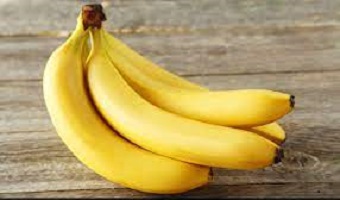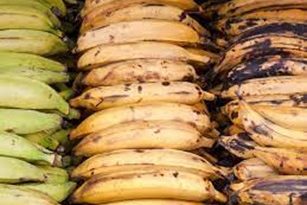Are Bananas Bad for Weight Loss?
Are Bananas Bad for Weight Loss?
Are Bananas Bad for Weight Loss? Science Says No. For weight loss, our science suggests that bananas are not a good option because of the high sugar content in the fruit.

Bananas can be included in a healthy diet, even if the objective is to lose weight, as the recommendation for a balanced diet calls for 3 to 5 servings of fruit each day.
In addition to being filling and healthy, bananas go well with a variety of other foods to make a more satisfying snack.
Although eating bananas won’t make you lose weight, some of the qualities of these fruits may help you feel less bloated, have more control over your appetite, and avoid processed sweeteners.
Bananas are a widely accessible, reasonably priced, and adaptable fruit. To give yourself an energy boost and a creamier texture, you can add some peanut butter, have one on the run, or blend it into a smoothie.
Table of Contents
Bananas for Weight Gain and Weight Loss ~ Bananas for weight loss or gain
The bananas can help with both weight loss as well as weight gain. Bananas have the right amount of carbohydrates and calories. Hence, incorporating bananas into your diet depends on your goals. You can eat up to one banana a day as part of a healthy diet for weight loss.
Do bananas help you lose weight? Are Bananas Fattening or Weight-Loss-Friendly?
Realizing that no single food has the ability to cause you to gain or lose weight is essential for any weight loss.
The most significant influence on your weight loss, particularly over the long run, will come from the balance of your daily meals and from how active you are.
Certain foods, such as those high in fiber or protein, will help you feel satisfied for a longer period of time while consuming fewer calories.
Hence, these dietary practices will help you lose weight if you eat fewer calories and include more fruits, vegetables, whole grains, and lean protein in your diet.
Nutrition facts about bananas
A medium banana has roughly 105 calories, 3 grams of fiber, and the fruit’s natural sugar (A quick rule of thumb is that one serving of carbohydrates should provide at least 3 grams of fiber).
As you surely already know, bananas also contain a lot of vitamins, including potassium. Bananas, like the majority of fruits, only contain carbs and contain neither fat nor protein.
The increased energy (calorie) content of bananas when compared to other fruits, like berries, lends them the unfavorable reputation of not being “helpful” for weight loss.
Bananas can be included in a healthy diet, even if the objective is to lose weight, as the recommended for a balanced diet is 3 to 5 servings of fruit per day.
In addition to being filling and healthy, bananas go well with a range of other foods to make a more satisfying snack. They are also a tasty treat.
Are Bananas Good Or Bad In Trying To Lose Weight? How Can Bananas Help You Lose Weight?
The impact of bananas on weight loss has not been examined in any studies.
Unripe banana starch, which is high in resistant starch, was examined in one research of obese, diabetic individuals to see how it influenced body weight and insulin sensitivity.
They discovered that consuming 24 grams of banana starch every day for four weeks resulted in a 2.6-pound (1.2-kg) decrease in weight in addition to an improvement in insulin sensitivity.
Fruit-eating and weight loss have been connected in other research as well. Fruit is rich in fiber, and studies have linked eating more fiber to losing weight.
Furthermore, resistant starch has drawn some attention recently as a component that supports weight loss.
By making people feel more satisfied and decreasing hunger, it might aid in weight loss by encouraging them to consume fewer calories.
Bananas have a number of qualities that should make them a healthy food for weight loss, even if no studies have demonstrated that they in and of themselves produce weight loss.
In light of this, bananas should not be included in low-carb diets. A medium banana has 27 grams of carbohydrates.
How Can Bananas Help You Lose Weight?
A great source of fiber is bananas. The daily recommended amount of fiber for people on a 2,000-calorie diet is 25 g, or 3.07 grams (g) from a medium banana.
According to research, consuming more fiber is associated with losing weight. Moreover, this vitamin may lower and regulate blood sugar levels.
Fiber can make people feel fuller for longer, which may result in fewer calories consumed overall.
Some types of fiber take the body a long time to digest, which helps it better control food intake.
According to the authors of a review that examined more than 50 research, increasing daily fiber intake by 14 g could result in a 10% reduction in total energy intake and a weight loss of 2 kilos (4.41 pounds) over the course of four months.
Are Bananas Bad for Weight Loss?

In a study from China, 100 overweight but otherwise healthy adults were examined to see how dietary fiber affected their hunger.
The findings demonstrated that increasing dietary fiber decreased participants’ feelings of hunger and their calorie intake.
Moreover, fiber may lower cholesterol and lower the risk of heart disease.
Resistant starch can be found in unripe green bananas. A carbohydrate known as resistant starch is one that is difficult for the small intestine to digest.
It does not raise blood sugar levels since it instead travels to the big intestine. It then undergoes fermentation in the large intestine, encouraging the development of healthy bacteria there.
Since resistant starch functions similarly to dietary fiber, eating more of it may aid in weight loss. Because it prolongs feeling full, it may help people eat less.
Resistant starch may also help increase insulin sensitivity, according to research. The advantages it offers for gut health can aid in relieving constipation and lower the chance of developing colon cancer.
Additional advantages
Although bananas are most frequently associated with their high potassium content, they also include a variety of other minerals that are vital for the body.
Potassium
For adults, a daily potassium intake of 2,600 milligrams (mg) for females and 3,400 mg for males is advised.
A medium banana provides 422 mgTrusted Source of potassium or about 12% of the daily requirement.
Potassium aids in the regulation of salt levels in the body, lowering blood pressure and reducing the risk of heart attack and stroke.
Also important for maintaining kidney health, it can lower the chance of kidney stones.
Magnesium
Furthermore, a good source of magnesium is bananas. A medium banana has 32 mg of magnesium, which is around 8% of the daily required amount (Trusted Source).
Magnesium is necessary for the synthesis of energy, proper nervous system operation, and control of blood pressure and blood sugar levels.
Bananas’ flavonoids and magnesium may also increase insulin sensitivity and lower the chance of developing insulin resistance.
The body’s blood sugar levels are regulated by insulin. The inability of the body to correctly utilize insulin can result in diseases like diabetes.
Energy
When working out, bananas are an excellent source of energy. According to the findings of a study conducted in 2012, a ripe banana had a comparable impact on endurance to a carbohydrate drink.
14 trained male cyclists completed two 75-kilometer time trials as part of the tiny study, and the researchers obtained blood samples before and after the exercise to determine the effects.
According to the study, eating a banana before and after an endurance workout improved performance, but not more than consuming a carbohydrate drink.
Banana eaters had higher dopamine levels, though. Dopamine, a neurotransmitter in the body, is in charge of motivational and rewarding feelings.
Nutrition ~ Banana Calories
Depending on its size, a banana’s exact nutritional value varies. A midsize banana with a length of 7-8 inches contains:
- Energy: 105 kcal
- Protein: 1.29 g
- Fiber: 3.07 g
- Carbohydrates: 27 g
- Fat: 0.39 g
- Potassium: 422 mg
- Magnesium: 31.90 mg
- Phosphorus: 26 mg
- Calcium: 5.90 mg
- Vitamin C: 10.30 mg
- Iron: 0.31 mg
- Folate: 23.60 micrograms (µg)
A, E, and K vitamins are also present in bananas in trace amounts.
Ripeness
Low GI foods are those with a glycemic index (GI) score of 55 or less. These foods will support stable blood sugar levels. Yet, a fruit’s GI score increases with increased ripeness.
An under-ripe banana has a GI rating of 30, while a 120-g ripe banana has a GI score of 51.
In a 2014 study, 45 participants with type 2 diabetes or high cholesterol were enrolled to investigate if eating 1-2 ripe bananas each day would help their lipid and blood sugar profiles.
The findings suggested that consuming this fruit regularly was safe for diabetics despite its high sugar level.
In patients with high cholesterol, adding bananas to the diet also marginally improved blood sugar levels and lipid profiles.
Eating a less ripe or smaller banana can reduce the amount of sugar consumed if people are concerned about the sugar content of ripe bananas.
Are Bananas Bad for Weight Loss? Conclusion
Although bananas do not directly aid in weight loss, they do contain qualities that can aid in weight management, such as a high fiber content.
Unripe bananas have resistant starch, which contributes to a longer-lasting feeling of fullness. By lessening the propensity to overeat, this satiety may promote weight loss.
In general, persons who are trying to lose weight should think about how many calories they are consuming compared to how many calories they are burning.
Consuming bananas in moderation as part of a balanced diet is healthy and nutritious.
FAQs about Are Bananas Bad for Weight Loss?
Why should people try to lose weight and avoid bananas? Reasons why you shouldn’t eat bananas for weight loss
Some “experts” claim that bananas have a higher sugar content than several other fruits. They also have more calories as a result.
Bananas should therefore be avoided if you want to reduce weight and avoid consuming too many calories. But hold on, please.
Which fruits are best avoided if you want to lose weight?
All fruits are healthy and have their own advantages, but if you want to lose weight, you should stay away from some of them.
The majority of fruits are sweet and rich in fructose, a type of natural sugar. Mangoes, grapes, cherries, figs, and any dried fruits are a few of the fruits you should stay away from if you want to lose weight.
Do bananas help or hinder the reduction of belly fat?
Bananas are sweet fruit, but they are also packed with nutrients that can aid with weight loss.
According to a study, one of the best remedies to your problem of a growing waistline is to consume more fruits and vegetables.
Does that, however, apply to high-carb foods like bananas? The quick response is “yes”!
Can I eat how many bananas per day and still lose weight?
They make a tasty dessert as well. In general, eating two or more servings of fruit each day is advised as part of a balanced diet.
One of those fruits that is definitely a wonderful choice is a banana, and as part of a healthy weight loss regimen, you can eat up to one medium banana every day.
Is one banana of sugar a day too much?
One banana a day is not a lot of sugar. Bananas contain fructose, a naturally occurring sugar, making them a good source of carbs. Sugar comes in two forms: natural and processed.
Why bananas are a good fruit for weight loss
Bananas are good for weight loss because they contain fiber, which slows digestion and keeps you full
Do bananas make you gain belly fat?
Bananas are a great fruit for a flat stomach despite having a lot of calories.
Healthy fibers found in bananas help control appetite and stimulate fat burning in the body.
Bananas contain resistant starch or indigestible fibers that prevent the body from absorbing carbohydrates.
Best time to eat bananas for weight loss
The morning
The best time to eat bananas is in the morning, especially when combined with other fruits or oatmeal, which can be extremely beneficial for those considering weight loss programs.
2 bananas a day for weight loss
One banana can be consumed daily as part of a balanced diet to help you lose weight.
However, eating 2 to 3 bananas will result in an additional 350 calories, which can aid in weight gain.
Before consuming bananas for weight gain or loss, you must comprehend how the fruit benefits you.
How many bananas in a day for weight loss
Two bananas are generally considered to be safe for consumption.
Dr. Sunali Sharma, however, advises against eating more than one medium-sized or 5″ banana per day if you’re trying to lose weight.
Is banana good for weight loss at night?
It promotes weight loss, protects the health of your heart, and guarantees simple bowel movements.
However, there are numerous myths surrounding banana consumption, the most popular of which is the notion that eating bananas late at night will make cold and flu symptoms worse.
3-day banana diet for weight loss ~ Can you lose weight by eating 3 bananas a day?
The right number of calories and carbohydrates are present in bananas.
As a result, adding bananas to your diet will depend on your objectives. One banana can be consumed daily as part of a balanced diet to help you lose weight.
However, eating 2 to 3 bananas will result in an additional 350 calories, which can aid in weight gain.


